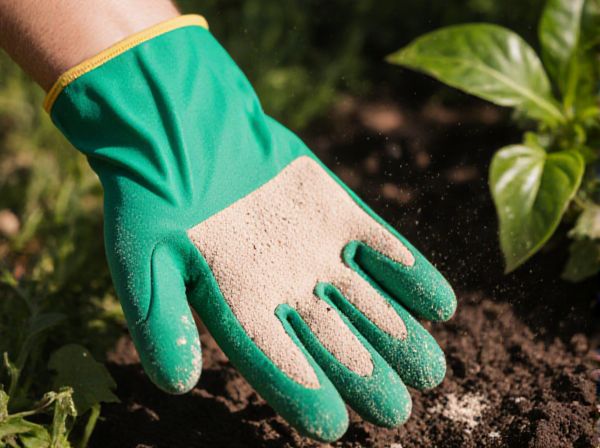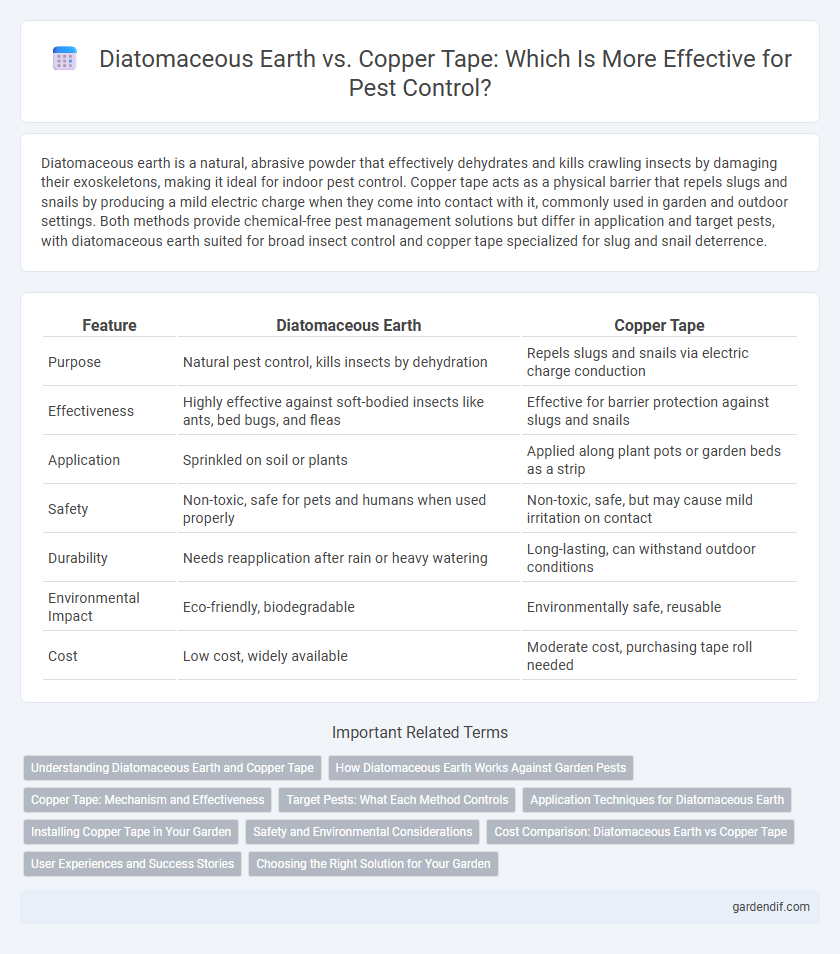
diatomaceous earth vs copper tape Illustration
Diatomaceous earth is a natural, abrasive powder that effectively dehydrates and kills crawling insects by damaging their exoskeletons, making it ideal for indoor pest control. Copper tape acts as a physical barrier that repels slugs and snails by producing a mild electric charge when they come into contact with it, commonly used in garden and outdoor settings. Both methods provide chemical-free pest management solutions but differ in application and target pests, with diatomaceous earth suited for broad insect control and copper tape specialized for slug and snail deterrence.
Table of Comparison
| Feature | Diatomaceous Earth | Copper Tape |
|---|---|---|
| Purpose | Natural pest control, kills insects by dehydration | Repels slugs and snails via electric charge conduction |
| Effectiveness | Highly effective against soft-bodied insects like ants, bed bugs, and fleas | Effective for barrier protection against slugs and snails |
| Application | Sprinkled on soil or plants | Applied along plant pots or garden beds as a strip |
| Safety | Non-toxic, safe for pets and humans when used properly | Non-toxic, safe, but may cause mild irritation on contact |
| Durability | Needs reapplication after rain or heavy watering | Long-lasting, can withstand outdoor conditions |
| Environmental Impact | Eco-friendly, biodegradable | Environmentally safe, reusable |
| Cost | Low cost, widely available | Moderate cost, purchasing tape roll needed |
Understanding Diatomaceous Earth and Copper Tape
Diatomaceous Earth consists of fossilized silica from diatoms, which acts as a natural abrasive that damages the exoskeleton of pests, leading to dehydration and death. Copper tape serves as a physical barrier with antimicrobial and electrostatic properties, effectively deterring slugs, snails, and climbing insects from crossing treated surfaces. Both methods provide eco-friendly pest control solutions, with Diatomaceous Earth targeting crawling insects through desiccation, while copper tape prevents pest access through a repellent surface.
How Diatomaceous Earth Works Against Garden Pests
Diatomaceous earth controls garden pests by physically damaging their exoskeletons with microscopic, sharp silica particles that cause dehydration and death. Unlike copper tape, which acts as a barrier deterring slugs and snails through electric charge buildup, diatomaceous earth provides a long-lasting, chemical-free pest management solution. Its abrasive texture is effective against a broad range of soft-bodied insects such as aphids, beetles, and caterpillars in vegetable and flower gardens.
Copper Tape: Mechanism and Effectiveness
Copper tape works by creating a physical and chemical barrier that deters pests, as the metal produces a mild electric charge when touched, irritating and repelling insects like slugs and snails. Its effectiveness is enhanced by its durability and resistance to moisture, making it suitable for indoor and outdoor use in gardens and greenhouses. Copper tape's ability to disrupt pest movement without harmful chemicals makes it an eco-friendly solution for controlling unwanted insects and maintaining healthy plants.
Target Pests: What Each Method Controls
Diatomaceous earth effectively controls crawling insects such as ants, bed bugs, fleas, and cockroaches by damaging their exoskeletons and causing dehydration. Copper tape primarily targets slugs and snails, creating a mild electric charge that repels these soft-bodied pests from garden plants. Both methods offer natural pest control but are suited for different pest types due to their distinct modes of action.
Application Techniques for Diatomaceous Earth
Diatomaceous earth is applied by dusting a fine, even layer along pest entry points, cracks, and surfaces where insects travel, ensuring thorough coverage to maximize contact with pests. It is essential to keep the area dry, as moisture significantly reduces its effectiveness by clumping the powder. Reapplication after cleaning or rain is necessary to maintain its pest control efficiency over time.
Installing Copper Tape in Your Garden
Installing copper tape in your garden creates an effective barrier against slugs and snails by emitting a mild electric charge when they come into contact with it, deterring these pests naturally. Apply copper tape around the rims of pots, raised beds, or garden beds, ensuring continuous, unbroken coverage to maximize its pest-repellent properties. Regularly check the tape for any damage or gaps, replacing sections as needed to maintain its effectiveness in protecting plants.
Safety and Environmental Considerations
Diatomaceous earth offers a non-toxic pest control solution safe for humans, pets, and beneficial insects, making it an environmentally friendly choice as it works mechanically by dehydrating pests. Copper tape, while effective as a barrier against slugs and snails, may pose minimal risks if ingested by pets and should be used with caution to avoid environmental contamination from copper residues. Both methods prioritize reducing chemical pesticide use but require correct application to ensure safety and environmental protection.
Cost Comparison: Diatomaceous Earth vs Copper Tape
Diatomaceous earth is often more cost-effective initially, with prices ranging from $10 to $30 per 5-pound bag compared to copper tape, which can cost between $15 to $50 for a 33-foot roll. While diatomaceous earth requires periodic reapplication after moisture exposure, copper tape provides a durable, long-lasting physical barrier, potentially reducing replacement frequency and overall expense. Evaluating the cost depends on pest control needs, application area size, and maintenance commitment.
User Experiences and Success Stories
Users report diatomaceous earth effectively controls crawling pests like ants and bedbugs by dehydrating their exoskeletons, with many noting its long-lasting residual impact. Copper tape receives praise for deterring slugs and snails in gardens, creating an electric barrier that pests avoid, resulting in healthier plants. Success stories highlight diatomaceous earth's affordability and natural composition, while copper tape stands out for easy installation and minimal maintenance in outdoor settings.
Choosing the Right Solution for Your Garden
Diatomaceous earth provides a natural, chemical-free approach to pest control by dehydrating insects, making it ideal for organic gardens. Copper tape creates an effective barrier against slugs and snails by delivering a mild electric shock, proving highly efficient in moist environments. Selecting the right solution depends on your garden's specific pest problems, climate conditions, and plant sensitivity to ensure optimal protection and growth.
diatomaceous earth vs copper tape Infographic

 gardendif.com
gardendif.com